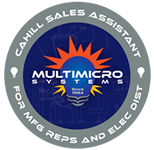In the dynamic landscape of sales management, having the right tools can make all the difference in achieving efficiency and maximizing productivity. As businesses evolve, so do the demands for sophisticated solutions. Choosing the ideal sales management software is a crucial decision that impacts the entire sales process, from lead generation to closing deals. In this comprehensive guide, we will delve into ten essential tips to help you navigate the diverse array of options and make an informed choice. Whether you’re looking for sales performance management software, sales lead management software, or a robust sales order management software, these tips will guide you in finding the perfect fit for your business needs.

Tip 1: Define Your Requirements Clearly
Before exploring the market, clearly define your business requirements. Identify your specific needs, such as sales contact management software, sales invoicing software, or Cloud-based Point Of Sale Software. This foundational step will ensure that the chosen software aligns seamlessly with your business objectives and workflow.
Tip 2: Assess Scalability
Consider the growth trajectory of your business. Opt for sales management system software that can scale alongside your expanding operations. Scalability is essential, ensuring the software remains effective and efficient as your sales team and customer base grow.
Tip 3: Integration Capabilities
Ensure that the selected sales managing software integrates smoothly with your existing tools and platforms. Look for compatibility with popular applications like Multi micro System to streamline processes and avoid disruptions in your workflow.
Tip 4: User-Friendly Interface
A user-friendly interface is crucial for swift adoption by your sales team. Choose sales management software that offers an intuitive and easy-to-navigate design. This ensures minimal training time and a smoother transition for your team.
Tip 5: Mobile Accessibility
In today’s fast-paced business environment, having a sales management solution accessible on mobile devices is a game-changer. Look for Our Best Software For Sales Management that provides mobile compatibility, allowing your team to stay productive while on the go.
“Ensure the software allows real-time updates and synchronization between desktop and mobile versions.”
Tip 6: Customization Options
Every business has unique processes and requirements. Opt for sales management software that offers customization options. This flexibility ensures that the software aligns precisely with your specific needs, whether it’s sales order management software or sales lead management software.
Tip 7: Analytics and Reporting Features
Effective decision-making relies on accurate data analysis. Choose a sales performance management software equipped with robust analytics and reporting features. This functionality provides valuable insights into your sales process, helping you identify strengths and areas for improvement.
Tip 8: Security and Compliance
Protecting sensitive sales data is paramount. Select a sales management system software that adheres to the highest security standards and complies with industry regulations. This ensures the confidentiality and integrity of your sales information.
“Check for features like role-based access control and encryption protocols for added security.”
Tip 9: Trial Period and Support Services
Before committing to a long-term contract, take advantage of trial periods offered by sales management software providers. This hands-on experience allows you to assess the software’s functionality and determine if it meets your expectations. Additionally, inquire about the support services available, ensuring prompt assistance in case of issues.
Tip 10: Cost Analysis and ROI
Evaluate the overall cost of implementing the sales managing software, considering both upfront expenses and ongoing fees. Calculate the potential return on investment (ROI) based on the software’s features and the improvements it can bring to your sales processes.
“Don’t solely focus on the initial cost; consider the long-term benefits and potential savings in time and resources.”
Conclusion
Choosing the right sales management software is a strategic decision that influences the overall efficiency and success of your sales operations. By following these ten tips, you can navigate the myriad options and select a solution tailored to your business needs. Whether it’s sales invoicing software, sales contact management software, or a comprehensive sales performance management software, prioritize scalability, integration capabilities, and user-friendly design. With careful consideration and adherence to these tips, you’ll empower your sales team with a robust tool that enhances productivity, drives revenue, and propels your business towards success.
In conclusion, the journey to selecting the optimal sales management software is paved with strategic considerations, and these ten tips serve as a reliable compass in navigating this complex terrain. Whether you’re in search of robust sales performance management software, efficient sales lead management software, or seamless sales order management software, each tip underscores the importance of aligning the chosen solution with your unique business needs. The significance of a user-friendly interface, mobile accessibility, and customization options cannot be overstated, ensuring that the selected software, be it for sales contact management or sales invoicing, seamlessly integrates into your workflow. As businesses evolve, scalability, integration capabilities, and adherence to security standards, including those required for cloud-based point of sale software, become paramount. In this quest for the ideal software for sales management, the multifaceted nature of the decision is evident, emphasizing the need for solutions that transcend conventional expectations. The ultimate goal is to empower businesses with tools, such as those provided by Multimicro System Software Solution, that not only meet immediate requirements but also pave the way for sustained growth and success in the ever-evolving realm of sales management.



